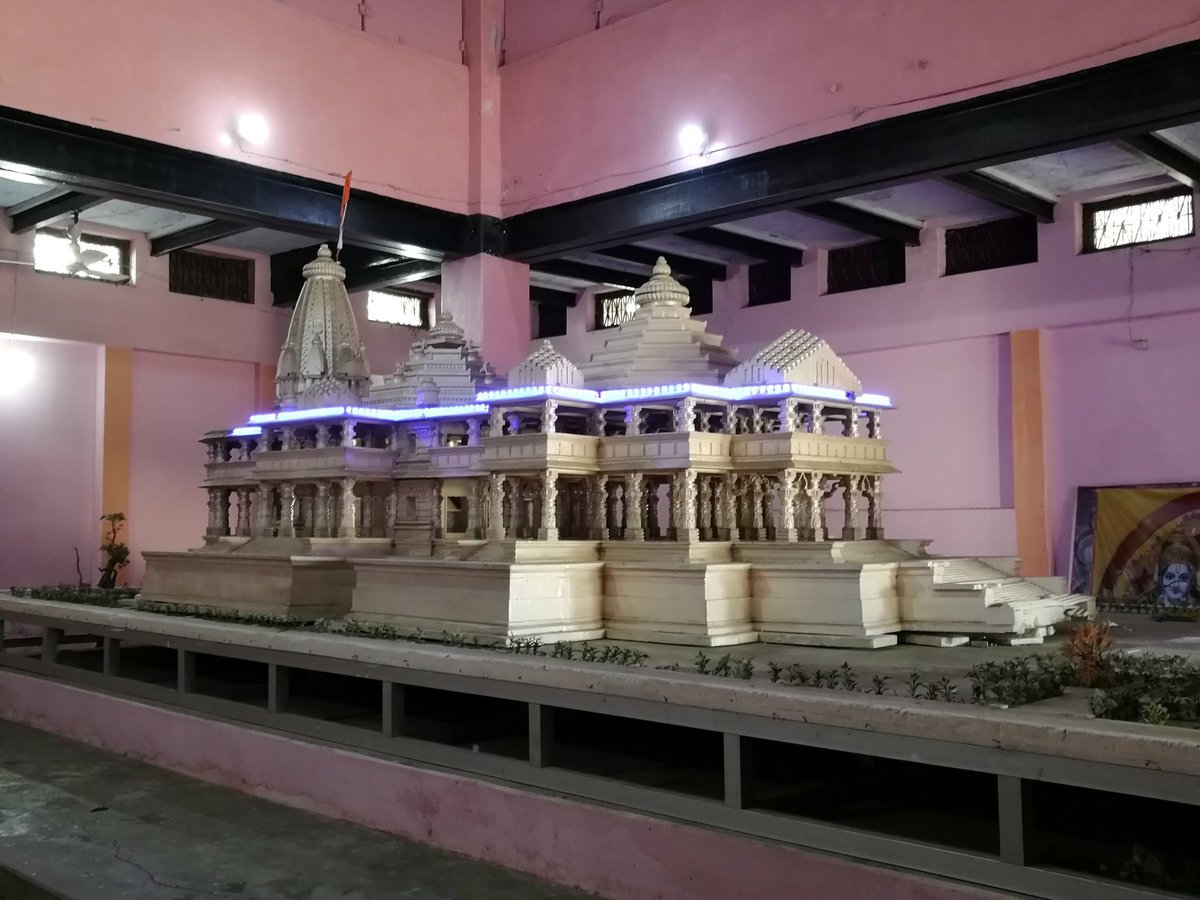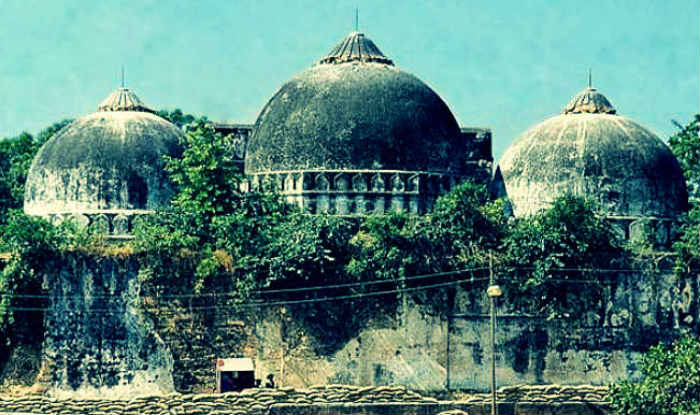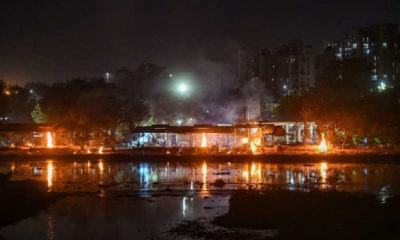Feature
After facing defeat in elections, BJP opens eye about Ram Temple issue

New Delhi: The Ram temple issue echoed in the BJP’s parliamentary party meeting on Tuesday, with some MPs asking when it will be constructed, to which Home Minister Rajnath Singh said that everyone wanted it and told them to be patient.
BJP sources said Ravindra Kushwaha and Hari Narayan Rajbhar, both of whom represent Lok Sabha constituencies from Uttar Pradesh, raised the issue, drawing support from others when Singh was addressing the party MPs.

Prime Minister Narendra Modi was not present in meeting, nor was party president Amit Shah.
Two party MPs said Singh told party’s parliamentarians that it is everybody’s wish to see a Ram temple in Ayodhya and asked them to be patient.

Hindutva organisations, including the Rashtriya Swayamsewak Sangh, have in the last few months intensified their demand for early construction of the temple, with many of them, including RSS chief Mohan Bhagwat, pitching for a law to enable it.
Though the BJP has agreed with the sentiments of these organisations, it has so far not come out in support of a law.
The Ram temple land dispute is presently being heard in the Supreme Court.
Soon after facing defeat in polls, Ram temple issue becomes eye-opener for BJP:
There is a view within the party that paving the way for the temple’s construction will boost its prospects in the Lok Sabha elections.
In his speech, Singh asserted Tuesday that the opposition has no leader to match Modi’s popularity and asked BJP MPs to work for the party’s re-election in the 2019 Lok Sabha elections.

After the party suffered defeats in the recent assembly polls in which it lost power in all three states it ruled, it is looking at a tough challenge from the opposition to its bid to return to power at the Centre in 2019.
“We are far ahead of the opposition. Circumstances are very good for us,” Singh said, according to Parliamentary Affairs Minister Narendra Singh Tomar.

Tomar also told reporters that the passage of the triple talaq bill, which stipulates jail term for Muslim men accused of giving instant divorce to their wives, in Parliament is a top priority for the government.
Law Minister Ravi Shankar Prasad briefed party MPs on the Supreme Court’s judgement on the Rafale issue, the conviction of Congress leader Sajjan Kumar in an anti-Sikh riot case besides the triple talaq legislation, Tomar said.
Entertainment
Meghalaya Reserves Legalized Gambling and Sports Betting for Tourists

The State Scores Extra High on Gaming-Friendly Industry Index
Meghalaya scored 92.85 out of 100 possible points in a Gaming Industry Index and proved to be India’s most gaming-friendly state following its recent profound legislation changes over the field allowing land-based and online gaming, including games of chance, under a licensing regime.
The index by the UK India Business Council (UKIBC) uses a scale of 0 to 100 to measure the level of legalisation on gambling and betting achieved by a state based on the scores over a set of seven different games – lottery, horse racing, betting on sports, poker, rummy, casino and fantasy sports
Starting from February last year, Meghalaya became the third state in India’s northeast to legalise gambling and betting after Sikkim and Nagaland. After consultations with the UKIBC, the state proceeded with the adoption of the Meghalaya Regulation of Gaming Act, 2021 and the nullification of the Meghalaya Prevention of Gambling Act, 1970. Subsequently in December, the Meghalaya Regulation of Gaming Rules, 2021 were notified and came into force.
All for the Tourists
The move to legalise and license various forms of offline and online betting and gambling in Meghalaya is aimed at boosting tourism and creating jobs, and altogether raising taxation revenues for the northeastern state. At the same time, the opportunities to bet and gamble legally will be reserved only for tourists and visitors.
“We came out with a Gaming Act and subsequently framed the Regulation of Gaming Rules, 2021. The government will accordingly issue licenses to operate games of skill and chance, both online and offline,” said James P. K. Sangma, Meghalaya State Law and Taxation Minister speaking in the capital city of Shillong. “But the legalized gambling and gaming will only be for tourists and not residents of Meghalaya,” he continued.
To be allowed to play, tourists and people visiting the state for work or business purposes will have to prove their non-resident status by presenting appropriate documents, in a process similar to a bank KYC (Know Your Customer) procedure.
Meghalaya Reaches Out to a Vast Market
With 140 millions of people in India estimated to bet regularly on sports, and a total of 370 million desi bettors around prominent sporting events, as per data from one of the latest reports by Esse N Videri, Meghalaya is set to reach out and take a piece of a vast market.
Estimates on the financial value of India’s sports betting market, combined across all types of offline channels and online sports and cricket predictions and betting platforms, speak about amounts between $130 and $150 billion (roughly between ₹9.7 and ₹11.5 lakh crore).
Andhra Pradesh, Telangana and Delhi are shown to deliver the highest number of bettors and Meghalaya can count on substantial tourists flow from their betting circles. The sports betting communities of Karnataka, Maharashtra, Uttar Pradesh and Haryana are also not to be underestimated.
Among the sports, cricket is most popular, registering 68 percent of the total bet count analyzed by Esse N Videri. Football takes second position with 11 percent of the bets, followed by betting on FIFA at 7 percent and on eCricket at 5 percent. The last position in the Top 5 of popular sports for betting in India is taken by tennis with 3 percent of the bet count.
Local Citizens will Still have Their Teer Betting
Meghalaya residents will still be permitted to participate in teer betting over arrow-shooting results. Teer is a traditional method of gambling, somewhat similar to a lottery draw, and held under the rules of the Meghalaya Regulation of the Game of Arrow Shooting and the Sale of Teer Tickets Act, 2018.
Teer includes bettors wagering on the number of arrows that reach the target which is placed about 50 meters away from a team of 20 archers positioned in a semicircle.
The archers shoot volleys of arrows at the target for ten minutes, and players place their bets choosing a number between 0 and 99 trying to guess the last two digits of the number of arrows that successfully pierce the target.
If, for example, the number of hits is 256, anyone who has bet on 56 wins an amount eight times bigger than their wager.























